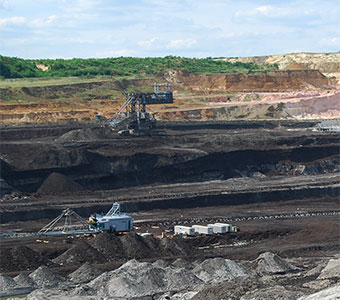EBRD policy breaches at Serbia coal mine confirmed by bank’s own complaint mechanism
Prague, Belgrade – A day after the Board of Directors of the European Bank for Reconstruction and Development (EBRD) approved a new EUR 200 million loan for Serbia’s electric utility Elektroprivreda Srbije (EPS), an internal review at the Bank finds that it breached its own environmental and social policy when approving the previous EUR 80 million loan to the same company.
29 October 2015

Prague, Belgrade – A day after the Board of Directors of the European Bank for Reconstruction and Development (EBRD) approved a new EUR 200 million loan for Serbia’s electric utility Elektroprivreda Srbije (EPS), an internal review at the Bank finds that it breached its own environmental and social policy when approving the previous EUR 80 million loan to the same company.
The report (pdf) published today by the EBRD’s independent Project Complaint Mechanism (PCM) is the result of an investigation into a 2011 loan to EPS to buy new mining equipment for the highly controversial Kolubara lignite mine.
The findings of the PCM report respond to two complaints – the first (pdf) filed with the bank by the Ecological Society of Vreoci and the Vreoci local council in 2012, and the second (pdf) by CEE Bankwatch Network member the Centre for Ecology and Sustainable Development (CEKOR) in 2013.
“The EBRD’s pick-and-choose approach to environmental and social assessment enabled straightforward support for the lignite sector to be presented as an ‘environmental improvement’ project,” says Fidanka Bacheva-McGrath, EBRD Policy Officer at Bankwatch. “The compliance review findings now confirm our view that this is unacceptable.”
The complaints centred around the EBRD’s pre-project environmental and social assessment, which evaluated the impacts of only selected parts of the Kolubara mine basin. The assessment also downplayed the negative aspects of the project, such as supporting mine expansion and creating the preconditions for the construction of a new coal power plant. Most notably, by excluding the village of Vreoci from its assessment, the bank attempted to avoid responsibility for the collective resettlement of 1180 households from Vreoci.
“Vreoci’s over 3000 residents suffer from unbearable noise, dust, limited access to running water, and smoke from spontaneous combustion of coal due to the mine operations and related transportation infrastructure, but have been waiting for nearly a decade to be collectively resettled”, explains Zvezdan Kalmar, Co-ordinator for Energy and Monitoring of International Financial Institutions at CEKOR. “The EBRD maintained that Vreoci is not part of the project it finances. But as well as being morally bereft this claim has now also been shown to be incompliant with the bank’s own policies”.
As the new report shows, the EBRD also failed to adequately assess the extent of greenhouse gas (GHG) emissions from the project. The bank admitted in a document presented to its Board of Directors before project approval that the new mining equipment would enable the production of lignite with more uniform quality, which was a precondition for a new power plant at the site. However, it omitted the GHG emissions from the new plant in its calculations and as a result presented the project as leading to reductions of emissions instead of increases. As the compliance report puts it: “The GHG assessment undertaken on the ‘Project’ is piecemeal, unsubstantiated in terms of supporting information […] and inconsistent with EBRD guidance and international good practice.”
The new loan, approved yesterday, is to be the bank’s fifth loan to EPS since 2001. The EBRD’s Management has responded (pdf) to the PCM report by persuading its client EPS to develop “an overall Resettlement Framework which will apply to all of its activities, including across the Kolubara mining basin”. It also committed that the EBRD will monitor the implementation of the plan.
“If the EBRD has learned any lessons from the PCM process, the new loan must come with strong conditions that demonstrate both the EBRD’s and its client’s commitments to ensure resolution for impacted communities through a new ambitious and well-resourced environmental and social strategy,” says Ioana Ciuta, Bankwatch’s Energy Co-ordinator. “The bank must also fulfil its commitment to help Serbia phase out coal and thus include conditions to ensure that EPS develops a strategy for diversification of the energy sector, including increased investment in energy efficiency and sustainable renewable energy.”
For more information contact:
Zvezdan Kalmar
Co-ordinator for Energy and Monitoring of International Financial Institutions, CEKOR (Serbia)
vodana@gmail.com
+381 65 55 23 191
Ioana Ciuta
Energy Co-ordinator, CEE Bankwatch Network
ioana.ciuta@bankwatch.org
+40 724 020 281
Twitter: @unaltuser
Never miss an update
We expose the risks of international public finance and bring critical updates from the ground – straight to your inbox.
